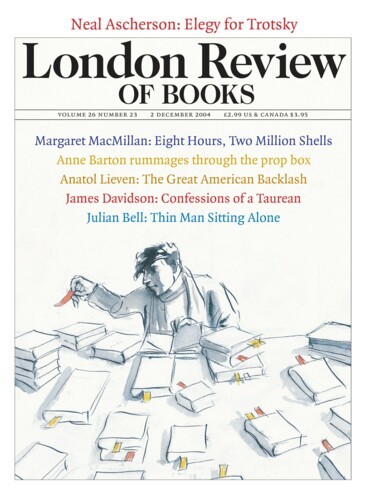It’s not every day that the soccer tifosi, those hardcore empiricists, come face to face with a well nigh theoretical observation to the effect that ‘football matches are iterative,’ which might give one to think that the teachings of the late Jacques Derrida, who had a lot to say about, and some cruel conclusions to draw from the iterability of language, had finally penetrated the press-boxes of Highbury and Old Trafford, there to sap the presumptions of the Saturday afternoon lodgers, as they sit at their laptops hurriedly searching for what just could be, you never know, novel ways of describing the familiar happenings they can see developing down below on the grass. But not so, the hacks are safe as yet from infiltration by any boarding party from the deconstructive tendency. The learned nod in the direction of the ‘iterative’ comes from the preface to a new and rather stylish Football Lexicon (Oleander, £9.95), a dictionary of usage that goes alphabetically on what I remember being called, a propos one or other lexically starved football commentator, a ‘jogtrot through the clichés’.
The compilers of this enjoyable sortie into metalinguistics are called Leigh and Woodhouse, the one a Sheffield Wednesday fan, driven to authorship it may be in the hope of taking his mind off the poignant decline in the standing of that pleasingly named old club, the other a supporter of Aston Villa, or the ‘claret and blues’, as some of us were brought up to know them, though now that teams seem to take the field in different colour shirts according to what time of day it is, that polychrome way of referring to them without actually naming them, may be dead or dying. And while we’re on names, Leigh and Woodhouse no doubt have first names but they’re not saying which, not even on the title page: a welcome token of austerity in these days, when it’s noticeable on the sports pages of, for example, the tabloid (né broadsheet) Times, that should for any reason a player’s first name not have been supplied in the original copy, it gets inserted in reprobatory square brackets by a populist subeditor, clearly afraid that without it we shan’t have any idea which of the many Rooneys there are to choose from abroad in the land has just, as it might be said, netted a brace for Sir Alex Ferguson’s Man U in the Premiership clash against the Magpies at St James’s Park.
[ ] Leigh and [ ] Woodhouse have done an excellent job, so far as I at least can tell. Jogtrot through their compendium and you will be hard pressed to think of any of football’s huge store of more or less viable tropes that they have missed. I had hopes for ‘custodian’, a sine qua non in the match reports at one time if the word ‘goalkeeper’ was to be avoided, though seldom to be met with now. The custodians of old tended to be inseparable from a qualifying ‘prostrate’, a graphic intensifier called for whenever an opposing Number 9 rounded them on the way to slotting home the equaliser, the winner or, at the worst, a late consolation goal. ‘Custodian’ has a particularly neat entry in the Lexicon: ‘Staple synonym always available for goalkeeper. Likely to be used with a degree of wry self-consciousness these days.’ Wry self-consciousness, though quite a standby for some of us when it comes to using clichés, is not perhaps an attitude widely shared among football writers and broadcasters, so it’s easy to see why custodians have now been shown the yellow card.
Forget about possible omissions then; more educationally, what serviceable bits and pieces from this evolving word-hoard has the Lexicon put in that we might not before have come across? Speaking for myself, the term ‘afters’, which ‘Resumes the idea of after the tackle or challenge: “There was a little bit of afters there between Mulryne and Magilton.” Afters can come before handbags, perhaps counter-intuitively.’ Bold type is the Lexicon’s means of cross-referencing, so you can move ahead and onto ‘handbags’: ‘Describes a contretemps in which arms are raised but which is not a fullblown fist fight.’ Given what was reported as having gone on recently in the players’ tunnel – no entry for ‘tunnel’: can that vital conduit between dressing-room (‘a location which hides a host of metonymic possibilities’) and pitch really be cliché-free? – following Arsenal’s defeat by Manchester United, with soup and pizza being thrown around, ‘afters’ seems just right, linking as it does the vocabulary of the football follower with that of the restaurateur. (Perhaps Leigh and Woodhouse can explain how it is that combustible players managed to get their hands on pizza and soup the moment they were out of sight.) It’s good anyway to have afters and handbags available for those moments of wry self-consciousness that are hard to avoid when we talk one another through last weekend’s game. Leigh and Woodhouse are civilised guides to all that’s tritest and best in football parlance.
Send Letters To:
The Editor
London Review of Books,
28 Little Russell Street
London, WC1A 2HN
letters@lrb.co.uk
Please include name, address, and a telephone number.

